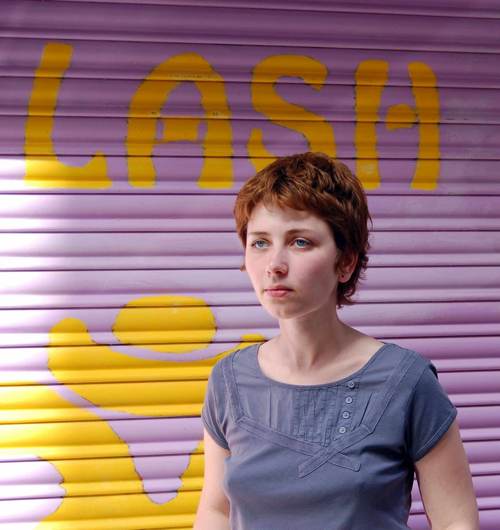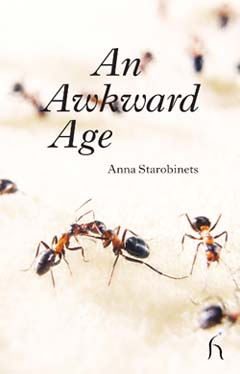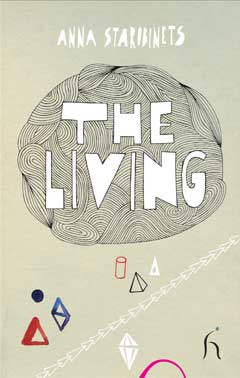Anna Starobinets
Today we're launching a new series of contemporary Russian literature, with six stories in six months, including interviews with their authors, sponsored by Powells.com. Will one of them blow your mind? We begin with the "Queen of Russian Horror."

Russian literature.
The very phrase implies indisputable greatness. So enshrined are the works of Tolstoy, Dostoevsky, and Chekhov in the iconostasis of world literature that non-Russian audiences often forget that there is a Russian literature devoid of samovars, counts, and love letters. And how would they know? More than two decades after the Soviet state ceased to be every Russian writer’s de-facto agent, only about a dozen literary agents represent Russian authors abroad.
Last month, in a splashy pavilion called “Read Russia!” in the middle of the none-too-splashy Jacob Javits Center in New York City, American publishers attending BookExpo America were invited to acquaint themselves with a “new generation of literary leaders” from Russia. Guests stopped by for the champagne toast to Pushkin and the sneak peek at Keira Knightly as Anna Karenina. A few had a legitimate passion for Russian literature; others were looking for the breakout Russian dystopia that would sweep aside every Swedish detective novel waiting on the big six’s foreign lists. None, that I saw, loaded up on the dozens of translated galleys made available for American rights purchase.
Anna Starobinets is a journalist, novelist, and screenwriter. The Awkward Age, her collection of short stories, was a finalist of the National Bestseller Prize in 2006 and has been translated into seven languages including English, Spanish, Italian, and Bulgarian. She is the author of seven published books, including two novels for children. Her novel The Living, forthcoming in English from Hesperus Press in 2012, is an anti-utopian tale likened to those of George Orwell, Yevgeny Zamyatin, and H.G. Wells.
Which is a shame.
I’m not a publisher—just a literary critic, a student of Russian literature, and the proud reader of two novels of Dostoevsky in the original—but I spent a solid day at Read Russia, meeting, reading, and listening to the representatives of this “new generation of literary leaders.” Recipients of a famously bibliophilic nation’s most prestigious awards. Writers of political stature, authors of cutting satire, chroniclers of one of the most tumultuous, pivotal, and, yes, phantasmagorical periods in Russia’s history. Writers who, when asked to estimate the size of their potential American audience, looked as if they had been asked to answer their nation’s most existential riddles. Writers who, when asked if Americans would understand, enjoy, and benefit from their works in the same way that the West has become indebted to the canon of 19th-century literature, replied with skepticism. Writers who, when asked if they would like more Americans to read their work, replied unequivocally: Yes.
And so, The Morning News is pleased to present, over the next six months, Reading Roulette. Every month we will bring you a short story or excerpt from a living writer in Russia, each a winner or finalist of one of the country’s major book awards. Each with a taste of either tea or insanity—just to keep you oriented. Each with the potential to blow your mind.
We begin with Anna Starobinets, whose debut manuscript, An Awkward Age, was a finalist for Russia’s National Bestseller Prize when she was only 26 years old. “I’m Waiting,” from that collection, is a taste (or, rather, a whiff) of the wickedly clever talent of this young “Queen of Russian Horror,” who, as you can read in a discussion that follows the story, is quite comfortable with that dark mantle.
So read on—you have nothing to lose. In fact, you have much to gain. TMN’s Reading Roulette is being sponsored by Powells.com. This Wednesday, we’ll randomly select two people from everyone who’s shared this article on Twitter by that point (and name-checked TMN and Powell’s) and award them a $25 Powell’s gift card.
I’m Waiting
by Anna Starobinets
Where she came from, I don’t know for sure. Most likely from the fridge. I had a saucepan of soup in there. For a long time. A very long time. My mother made the soup—she used to drop in at times before—but I don’t eat that kind. Cabbage soup. After a week, the contents of the saucepan were covered with a pale green film and had started to smell. I put a lid on the saucepan and put it away in the fridge. It would have been a shame to pour it away. After all, Mum had made it.
A month later I woke up in the night feeling strangely disturbed. I went into the kitchen for a bite to eat. There was almost nothing in the fridge. A couple of sausages, some ravioli, a lemon I’d squeezed that morning. And the saucepan. I took it out and decided finally to pour it away. I held my breath and took the lid off. It had congealed. Changed. It was…almost beautiful. I didn’t feel at all like scraping it off the bottom and the sides, buying a cleaning agent, washing the saucepan clean.
I decided to throw it all out, together with the saucepan. I packed it up in several plastic bags and in the morning, before work, I carried it to the rubbish tip. I went up to a bin. And couldn’t bring myself to do it. I’d had it for such a long time… I began to feel it was a shame. I put the package down next to the bin and went off to work.

In the evening it was there as before.
The next day, when I looked out of the window, the package wasn’t there. I grew alarmed. I went downstairs, went up to the rubbish bin…no, there it was. Simply it wasn’t visible from the window. Just in case, so as not to worry for no reason, I took it back home. Put it in the fridge again.
It smelt really bad. I stopped using the fridge. And then the kitchen too—I hung an iron padlock on the kitchen door. Ate in various greasy spoons. And one day I rang my mother and asked if I could stay with her for a while. She agreed to it. She was pleased.
I moved, but a week later I’d already started fretting. After all, I did have a responsibility. I was constantly wondering how it was getting on there without me. Completely alone. In the plastic bags.
And I went back. The smell had impregnated the entire apartment so deeply that it made my head spin.
The door into the kitchen was open.
The bags were lying around on the floor.
It was then that I saw her for the first time. She came up to me trustfully, with curiosity. She was quite tiny.
At first I didn’t know how to feed her. I brought her mixtures of vegetables, made mashed potato, soaked white bread in milk. But she didn’t eat it.
I don’t think she ate at all. Nor did she drink. Nor could she talk.
She slept in the kitchen. I’d open the fridge door for her at night—for illumination, instead of a nightlight. Otherwise she was frightened. When she had nightmares, she’d scratch at my bedroom door. And I’d take her into my bed. Although she smelt dreadful.
I did ever such a lot for her. Sacrificed a lot.
I never aired the place—she wasn’t herself if I did. I don’t think anyone apart from me could have been with her. But I loved her. I rang my mother and everyone I knew, and asked them never to come and visit me again. I rang work and said I was quitting. And then I cut the telephone wire.
I loved her very much. So much, that sometimes I even touched her. And put my arms around her.
When she had nightmares, she’d scratch at my bedroom door. And I’d take her into my bed. Although she smelt dreadful.
She grew quickly. Very quickly. She’d grow by about a centimeter a day. And… she was beautiful. In her own way.
Sometimes someone would ring at the door, and so I broke the bell. So that we wouldn’t be disturbed.
It happened one morning. They knocked the door down and burst into my home. The neighbors from downstairs and people in protective clothing. They were wearing gas-masks. She was dreadfully scared, and ran away into the kitchen and tried to hide under the table or behind the fridge. But she was already too big and wouldn’t fit anywhere. They opened all the windows. I said, ‘Don’t, she’ll choke!’ They tied my hands and led me out of the apartment. I couldn’t help her.
As I was leaving, I saw that three men in gas-masks had remained there. They were spraying something pungent and poisonous from a container. On the walls, and on the floor, and straight onto her. Straight into her face. And she had nowhere to hide.
What have they done to her? Good Lord, what have they done to her?
Since then I’ve never once seen her. She doesn’t come here, to the place I live now.
I think about our life together—every hour, every minute—and can’t forgive myself. I should have treated her more affectionately. Put my arms around her more often, talked to her. And not made her sleep by herself, in the kitchen. She was lonely there.
I want to put everything right. And I will put everything right, I will. A week ago Mum brought me some baked apples, and I wrapped them up in a plastic bag and put them away in my bedside cabinet. Today, when the doctors had gone, I had a look inside the bag. They’ve already changed a bit: got softer and become covered in white down. And in a few days’ time they’ll have changed even more.
I’m waiting. I’ve got a lot of patience.
She’ll come back to me.
A Discussion With Anna Starobinets
Elizabeth Kiem: I loved this piece (“I’m Waiting”) because I have a special spot in my heart for the sour stench of Russian apartment entryways. What does Russia smell like to you?
Anna Starobinets: In Russia I mostly smell Moscow, where rented apartments smell of a half-decayed Soviet empire—its carpets, its polished furniture, its linoleum, and oilcloth on the table. Outside, most places in Moscow smell of gasoline, money, and construction dust. Like New York—only in New York there are also hints of street food both fresh and rotten, while here there are almost no organic whiffs. But where I live—Frunzenskaya Embankment—it smells of a village stream and dry grass, and that brings me to life in the capital.
EK: What smells bring you most quickly to memories?
AS: I have a very fine sense of smell, which is important to me. The smell of cabbage soup and kraut takes me back to kindergarten, which I recall with disgust and horror. The smell of a large anthology and old wood (the library), back to my student years, along with the smell of marijuana and coffee. The smell of men’s cologne and deodorant on mass transport—sometimes they take me back for a second to someone whose face I can no longer remember in detail. Memory erases faces—but not smells.
EK: You use a lot of fairy tales and child protagonists in your work. Why is childhood so primed for the intrusion of horror?
AS: Because children exist de facto on the border of two worlds—the real world (in our understanding) and the magical—it’s easier for a writer to set any sort of unclean spirit in this “no-man’s zone” than in the rational world of adults. More importantly, a child is a borderline, incomplete, inconclusive being, like in a stage of metamorphosis. A creature undergoing transformation can, in itself, be frightening.
To put a label on a Russian writer is almost impossible. Nobody takes these labels seriously—not the author, not the reader, not even the critic who uses the label.
EK: You’ve been draped in a mantle that some authors might find constraining. How does it feel to be the “Russian queen of horror?”
AS: This mantle suits me. When I grow tired of it, I can very easily take it off and still be in a short, flowered dress. Personally, I don’t consider myself a “horror specialist.” What I’m doing is broader. But happily, in Russia what is expected from any writer, whether a detective or romance writer, is something else—the answers to “those cursed Russian problems,” Dostoyevskian wretchedness, Tolstoyan scope. To put a label on a Russian writer is almost impossible. Nobody takes these labels seriously—not the author, not the reader, not even the critic who uses the label.
EK: Your upcoming book The Living is a dystopian fantasy. Is the thirst for dystopia a global phenomenon, or is it omnipresent and magnified by current American and Russian trends? Is it the best avenue out of the “Russian ghetto,” the place, as you have noted in some interviews, from which foreign publishers “expect a bear, vodka, and a balalaika?”

AS: Originally, dystopia was shared between English ([George] Orwell and [Aldous] Huxley) and Russian (Yevgeny Zamyatin) writers. Recently, they have been joined by the French, represented by [Michel] Houellebecq (The Possibility of an Island). Though I must say that Russian writers now writing anti-utopia in large quantities are mainly focused on “negative scenarios,” I’m interested in the global. But I did look for an “exit from the ghetto” consciously. I just really “get” Western (American and European) socio-cultural context. The borders have long been open—world literature is accessible and, in the end, we all have one internet.
EK: You’ve been compared to Nikolai Gogol, certainly for your embrace of the macabre and absurd and your treatment of the sinister and perverse functions of bureaucracy. Do you find instances of flat-out horror in Gogol? Because some of your stories are truly terrifying.
AS: Comparisons with Gogol is extremely flattering. He is one of my favorite of the classics. “Pure” horror doesn’t exist in Gogol, nor in [Mikhail] Bulgakov, [Ray] Bradbury or [Franz] Kafka, nor—I dare hope—in my work. A good writer can’t write “pure” horror, since real literature is always broader than a genre. But returning to Gogol—yes, there are some soul-chilling moments. The dead maiden from “Viy” flying on the guy’s back? That’s a terrifying character that scared me as a child. And the Viy itself—a monstrous figure and especially frightening is the naïve folk simplicity that created it. Gogol himself wrote, “Viy is a colossal creation of a simple-folk imagination.” The whole story is a folktale, handed down. The Viy is, in Ukrainian, the king of the Gnomes, whose eyelashes touch the ground. A monster that cannot, without outside assistance, open his eyes. It causes more than fear—it causes a visceral, physiological fear.
EK: You’ve said you owe a debt to Neil Gaiman and are influenced by [E.T.A.] Hoffmann and [Ray] Bradbury. How important is translation in bringing these authors to you, and how concerned are you by the quality of translation of your prose into other languages?
AS: Translation is extremely important for any work’s comprehension. For example, in Russia poor translation practically buried Stephen King’s best works (for intellectual readers). Gaiman, Kafka and Bradbury fared a little better. All the same, I always try to familiarize myself with texts not just in translation, but also in the original. Translation of my own text, naturally, concerns me a lot. But, just as with air flights (they worry me a lot, too)—there’s nothing you can do but trust the pilot and the translator.
